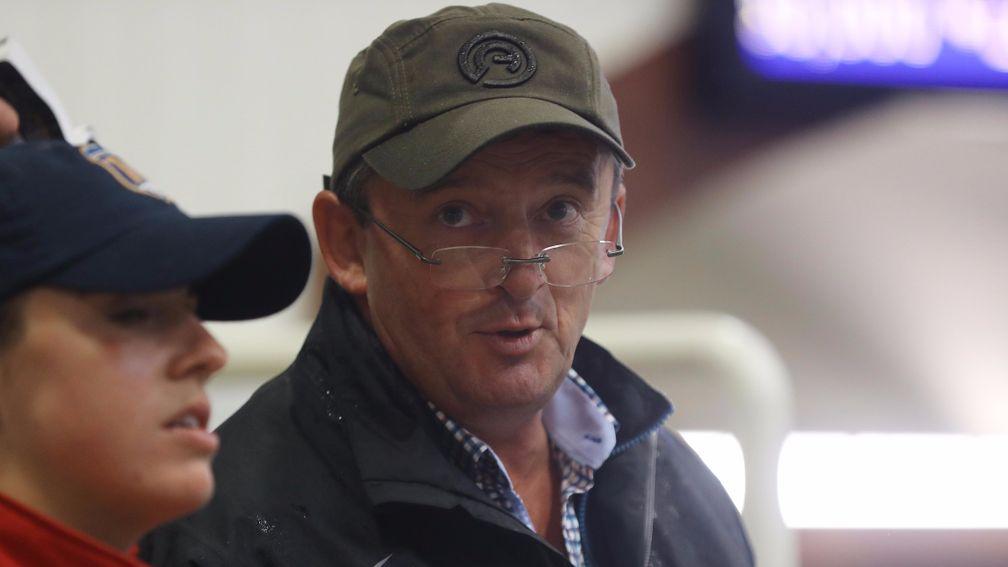Industry leaders warn of disaster for Irish breeders as Brexit looms
Eddie O'Leary fears impact of Britain leaving single market and customs union

Brexit could lead to the destruction of the Irish bloodstock industry if a trade deal between Britain and the EU cannot be agreed.
That was the stark warning from Eddie O’Leary who was taking part in the ‘What If? A Vision for 2028’ forum at the ITBA Expo at Goffs on Friday night.
O’Leary’s vision of Irish breeding and racing in 2028 was apocalyptic, predicting the demise of the industry if Britain exits the customs union and single market.
“Britain is our biggest market and if we cannot sell to it then we are finished. The introduction of tariffs would potentially be catastrophic for the Irish industry,” said the Lynn Lodge Stud owner.
O’Leary, who also manages his brother Michael’s Gigginstown House Stud enterprise, was responding to a speech on Brexit and its implications for the Irish bloodstock industry delivered by Mairead McGuinness, MEP for the Midlands North constituency and vice-president of the European Parliament.
“The majority of our horses are for export and the majority of them will go to Britain – 65 per cent of yearlings sold in Britain are Irish-bred and 90 per cent of horses at British breeze-up sales come from Ireland,” O’Leary said.
He also suggested that operations such as his own, along with Irish stud farms, could be forced to set up satellite operations in Britain as a way of circumventing the possible border and tariff issues.
'A worrying situation'
His gloomy concerns were echoed by Ballyhane Stud’s Joe Foley, who brought up the issue of the status of Irish sales staff working at the UK sales after Brexit.
“Irish grooms going to sales in Britain is a worrying situation," he said. "What will happen with movement of staff as well as the implications of tariffs on horses?”
McGuinness assured the audience that if the negotiations fail to avoid the introduction of customs and border controls, it will not affect Irish people.
“The common travel area which covers Ireland and the UK will prevail but the UK is very strong on taking back control of immigration so there are likely to be implications for workers from other member states," she said.
In her address to the ITBA members gathered in the Goffs sales ring, McGuinness outlined how the Tripartite Agreement between Ireland, the UK and France will no longer apply if Britain leaves both the customs union and single market.
“After Brexit the UK will be a third party and without the Tripartite Agreement there will be implications for animal welfare with the potential for the reintroduction of border controls and customs checks impacting on the movement of animals,” she said.
McGuinness dismissed any suggestion that a second referendum on Brexit could be called and called on all concerned to begin preparing for Britain's departure from the EU.
“Another referendum is not one of our options as we have to respect the vote," she said. "I believe it will happen. The UK’s relationship with the EU has always been less close than other states but they have always been great colleagues. The UK needs to stay in the customs union at a minimum and it would be better if they stayed in the single market too.”
'Welfare consequences'
Louis Romanet of the International Federation of Horseracing Authorities, and a much-respected figure in France, agreed with McGuinness’ assessment that Brexit could have a negative effect on animal welfare and restrict the movement of horses from France to
Ireland.
“The true picture is there will be damage for France but Ireland will be the number one country that suffers," he said. "80 per cent of horses that travel from France to Ireland go through Britain so it will become much too expensive to transport horses if the Tripartite Agreement is changed.
"Bringing back border inspections will cause delays at ports that will have welfare consequences for horses."
McGuinness, a former agriculture journalist and an MEP for Fine Gael since 2004, urged those present to speak with their colleagues in the UK and help them to understand the consequences of Brexit on the industry.
“Unless the UK withdraws its red lines, there will be change after 2020 and it will affect everyone if the UK leaves the customs union," she said.
"It is possible to reverse this with strong political leadership but the Conservative Party is being torn apart internally. If this goes
wrong it will have dire effects for Irish racing and breeding."
If you are interested in this, you should read:
HRI chief Kavanagh cheered by recent Brexit talks breakthrough
Published on 27 January 2018inInternational
Last updated 17:58, 27 January 2018
- $550,000 colt by 'on fire' Nyquist heads OBS Spring Sale trade
- Chaldean to shuttle to Cambridge Stud in New Zealand for 2024 season
- All aboard the Yulong stallion express! Japan’s Saudi Cup hero Panthalassa joins roster
- 'She’ll stay here now, she won’t be going back' - Amelia’s Jewel's dam Bumbasina will not be sold
- Poignant Satsuki Sho triumph for Nunthorpe heroine's son Justin Milano
- $550,000 colt by 'on fire' Nyquist heads OBS Spring Sale trade
- Chaldean to shuttle to Cambridge Stud in New Zealand for 2024 season
- All aboard the Yulong stallion express! Japan’s Saudi Cup hero Panthalassa joins roster
- 'She’ll stay here now, she won’t be going back' - Amelia’s Jewel's dam Bumbasina will not be sold
- Poignant Satsuki Sho triumph for Nunthorpe heroine's son Justin Milano